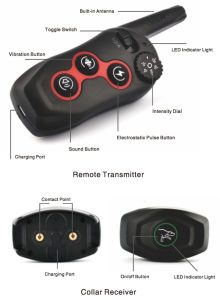
doBe Dog Training Anti-Bark User Guide
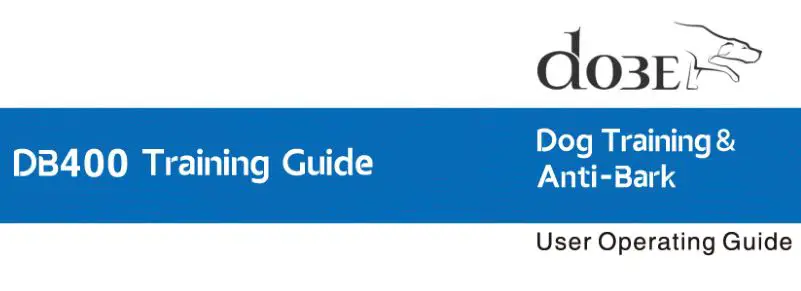
Please read this guide thoroughly before operating the Dobe Dog Training System
Thank you for choosing Dobe Dog Training System
Our mission is to ensure your dog’s safety by providing you the tools and techniques to successfully train your dog. Should you have any queries, please contact our customer service.

WARNING (Not for aggressive dogs)
Do not use this product if your dog is aggressive, or if your dog is prone to aggressive behavior.
Aggressive dogs can cause severe injury and even death to their owner and others.
If you are unsure whether this product is appropriate for your dog, please consult your veterinarian or certified trainer.
 CAUTION (Risk of skin damage)
CAUTION (Risk of skin damage)
Please read and follow the instructions carefully in this guide. Proper fit of the collar is important because a loose collar may cause inconsistent performance.
A collar worn for too long or made too tight on the dog’s neck may cause skin damage. ranging from redness to pressure ulcers (commonly known as bed sores).
These collars can cause pressure necrosis if used incorrectly and is often misidentified as burns.
Avoid leaving the collar on the dog for more than 12 hours per day. If possible, reposition the collar on the pet’s neck every 1 to 2 hours. Check the fit to prevent excessive pressure, and it is okay to trim any excess strap length.
Never connect a lead to the electronic collar, because it may cause excessive pressure on the contacts.
Wash the dog’s neck area and the contacts of the collar weekly with a damp cloth.
Examine the contact area daily for signs of a rash or a sore.
If a rash or sore is found, discontinue use of the collar until the skin has healed.
If the condition persists beyond 48 hours, see your veterinarian.
These steps will help your dog safe and comfortable. Millions of dogs are comfortable while they wear stainless steel contacts. Some dogs are sensitive to contact pressure. You may find after some time that your dog is very tolerant of the collar. If so, you may relax some of these precautions. It is important to continue daily checks of the contact area. If redness or sores are found, discontinue use until the skin has fully healed.
How the dog training system works?
Dobe products are reliable, effective, and comfortable for large or small dogs.
The system assists in controlling your dog without a leash in a range up to 400M! Instantly send a signal from the Remote Transmitter, which activates your dog’s Collar Receiver. The dog will receive an annoying but safe, harmless stimulation. With correct, consistent use of this product, the dog will associate his misbehavior with your corrections, and soon enough, you will have a well-trained dog.
This particular model features adjustable levels of stimulation enabling the user to tweak accordingly to the dog’s temperament, removing the risk of over stimulation.
And it can solve the problem of dog random barking, Just need to adjust to Anti-bark mode, When dog barking, The dog will receive an annoying but safe, harmless stimulation. make dog stop random barking behavior
If the transmitter and receiver collar don’t work for a long time, you should charge it fully before keeping it idle, and charging it every one month.
Main Features
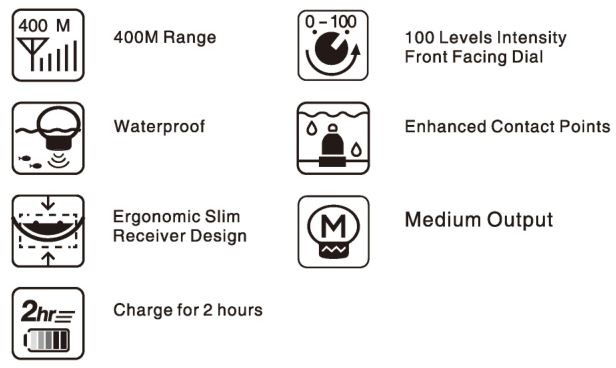
Overview
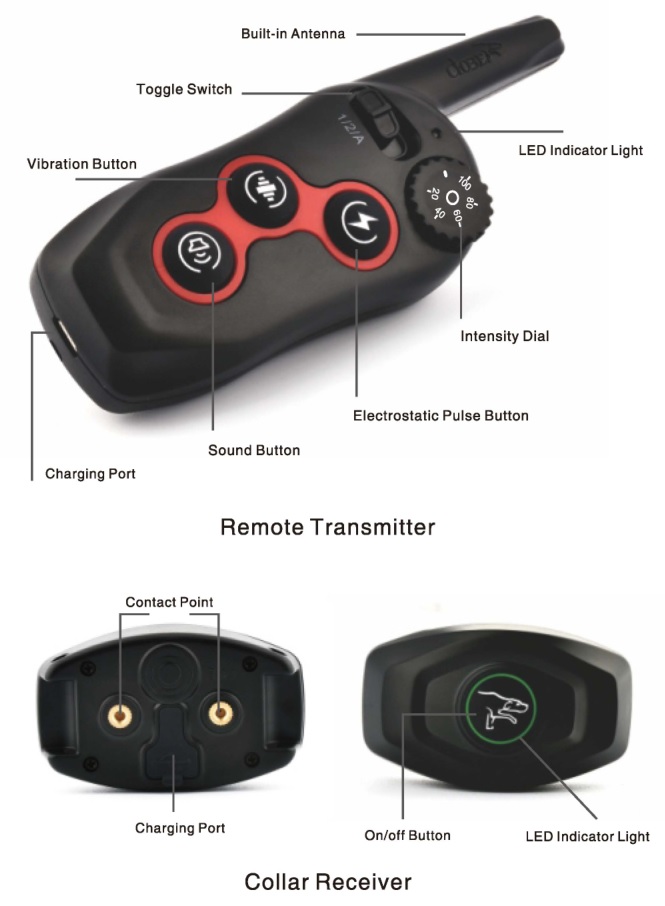
Understanding Your Training Device
1. Charging the battery for 2 hours
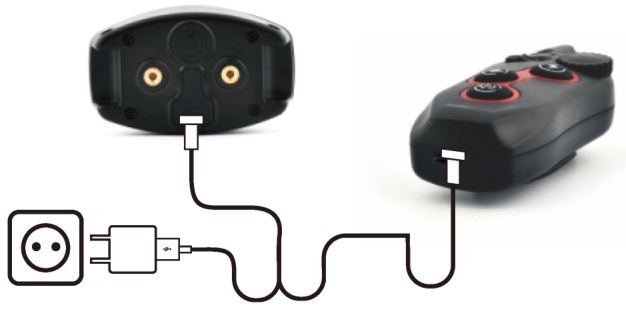
2. Pairing Collar Receiver to Transmitter
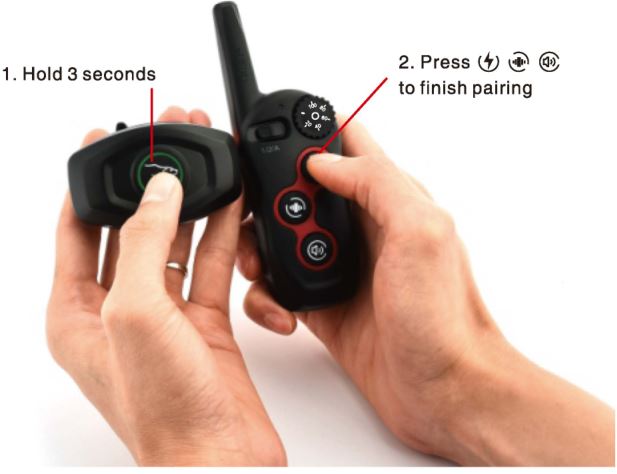

Note:
Click to turn on the collar receiver; (short vibrate)
Double-click to turn off the collar receiver (long vibrate)
Pairing must be finished in 10 seconds. (seethe collar receiver, the led light flashing 10 seconds)
You will hear 2nd “beep” from collar receiver, that means pairing is successfully
If needs to pairing 2nd collar receiver, follow the same steps but needs push the toggle switch to 1 /2 direction
3. Test the Dog Training System Functions
Electrostatic Pulse
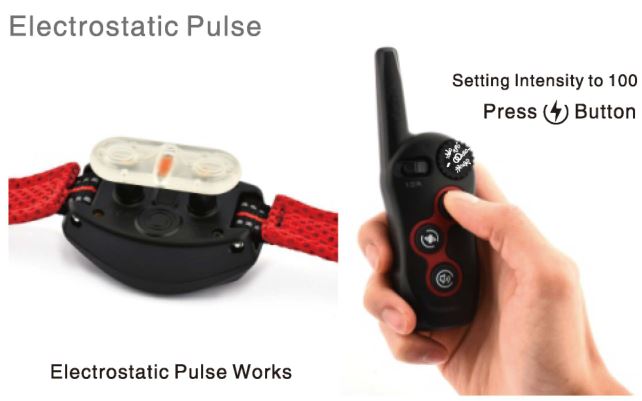
We suggest giving the dog, vibration stimulation before following it with electrostatic pulse stimulation.
After training a while using this method, dog will be aware that after vibration comes a electrostatic pulse.
Vibration will act as a warning, and electrostatic pulse only acts as a menace that might be necessary sometimes.
Vibration Stimulation
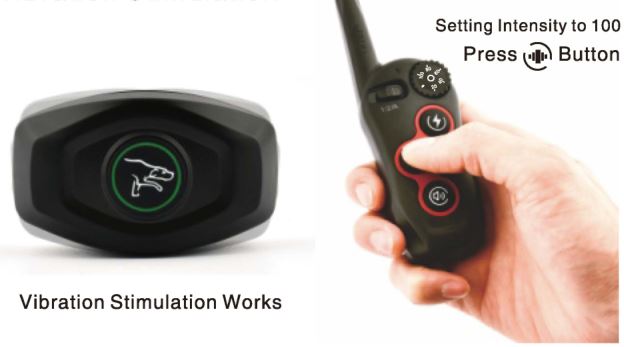
Sound Stimulation
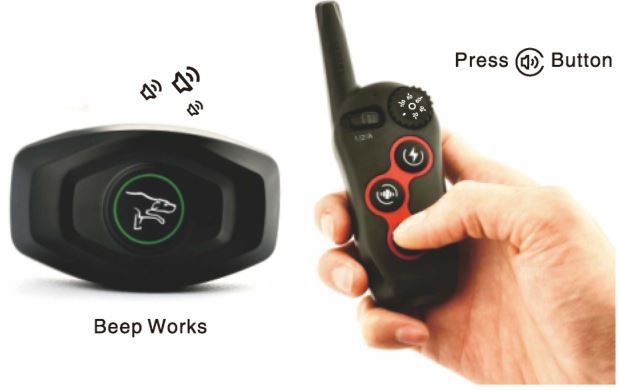
Anti Bark Mode
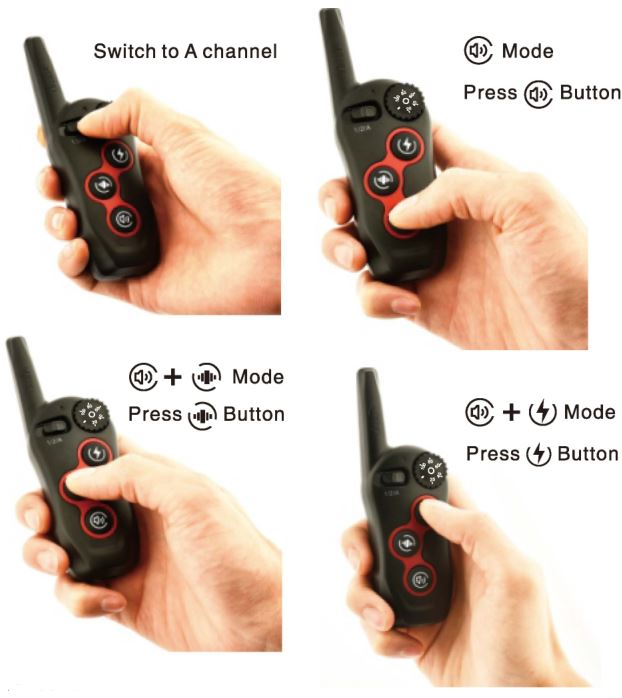

The more intense beep are applies after each bark until your dog stops for 30 seconds, and then anti-bark will automatically resets to the first “beep”) level of correction
Still barking after 4 times, Each time will keep working as the fourth working time until the dog stops barking for 30 seconds. The device automatically reset to the first time working level

The more intense beep and vibration are applies after each bark until your dog stops for 30 seconds, and then anti-bark will automatically resets to the first “beep” only) level of correction
Still barking after 5 times, Each time will keep working as the fifth working time until the dog stops barking for 30 seconds. The device automatically reset to the first time working level (Beep Only)

The more intense beep and shock are applies after each bark until your dog stops for 30 seconds, and then anti-bark will automatically resets to the first “beep only) level of correction
If the anti bark keeps activates for 6 times, it will enter into auto-protection mode. The LED indicator will be blinking for 30 seconds to stop working to protect the dog.
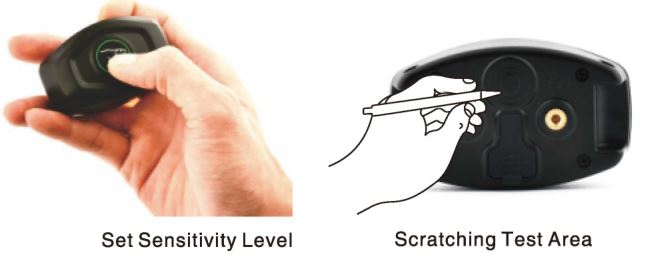
Set the Sensitivity to 4 Level by press the ON/OFF Button
1 “Beep”= Level 1
2 “Beep”= Level 2
3 “Beep”= Level 3
4 “Beep”= Level 4
1 “Long Beep”= Level 5
4. Collar Fitting
The collar receiver should be fitted so that the contact points press firmly against the dog’s skin. When properly fitted, you should be able to fit a finger or two snugly in between the contact points and your dog’s skin.
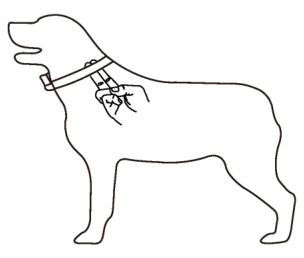
5. To Maximize the Distance
The Training Dog Device has 400M range. The range may vary depending on the way the transmitter is held. Hold the transmitter away from your body to receive the greatest range. For maximum signal strength, keep the Training Dog Device properly charged.
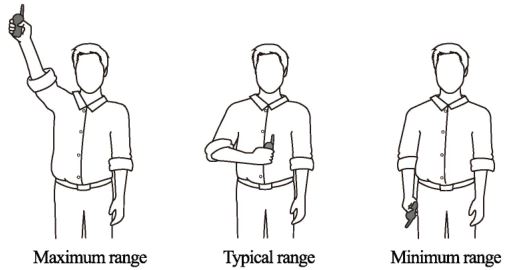
Avoid touching the antenna or the range may decrease substantially
6. The LED Indicator
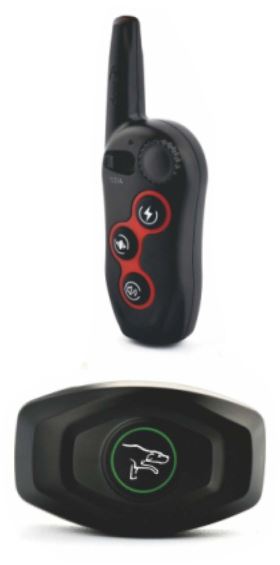
Transmitter Indicator Light:
Show up when the transmitter is recharging.
Will turned off when the battery charged fully.
Will flash when press modes button.
Will blink when it standby within 20 minutes.
Will 1 second blink twice when it power low.
Collar Receiver Indicator Light:
Show up when any of the stimulations are pressed on the transmitter or the battery fully charged.
Will blink in standby within 20 minutes or the collar receiver recharging.
Will Flash quickly when it into 10 seconds Pairing status.
Will 1 second blink twice when the battery power low. That means you need recharging for collar receiver. ( Standbys 3 second blink once)
Frequently Questions
- How old does the dog have to be before using the system?
Your dog should have learned basic obedience commands such as “Sit” or “Stay”. The Collar Receiver might be too large for dogs under 15 pounds. - Once my dog completes training and is been obeying my commands, will he have to wear the Collar Receiver?
Probably not. But you may try to reinforce training with the Collar. - Can I use Dobe Dog Training System with more than one dog?
Yes, you just need to purchase another collar receiver for the system. - Can I attach a leash to the Collar Receiver?
NO. This can result in pulling the Contact Points too tightly against your dog’s neck. Attach a leash to a separate, nonmetallic collar or a harness. Ensure the extra collar does not put pressure on the Contact Points. - How long can I leave Collar Receiver on my dog?
The design of the collar discourages constant wearing.
We recommend not having the dog wear the Collar for more than 12 hour out of every 24-hour period. - How long should I Process my training session for my dog?
Training sessions should be kept positive and short, it is better for about 10-15 minutes long each time. - Is the dog training system suitable for all dogs?
We have four size of collar for choose, they are: S:23-33cm Neck, M:33-43cm Neck, L:43-53cm Neck, XL:53-63cm. if your dog’s neck circumference is smaller than 9.1″ or larger than 24.8″ , This collar may not be suitable for the dog. this Collar is not suitable for the dogs under 12Ibs.
Troubleshooting
1. My dog is not reacting to the collar.
Make sure the receiver/collar is turned on. And check the intensity levels of vibrate, electrostatic pulse, make sure it is not set to 0.
Be sure the strap is on the dog tight enough so that both contact points are touching the dog’s skin.
The contact points may be too short for your dog’s thick or long coat. If you are already using longer contact points, you may need to trim the hair on the dog neck, so that both contact points are touching the dog’s skin.
If tested for all of the above and the dog is still not responding, please try re-pairing the Remote Transmitter and Collar Receiver.
2. I want to test Collar Receiver myself, but it does not work.
When testing the collar by your hands, please touch the two electrodes simultaneously, as touching one electrode will not work.
3. LED indicator light comes on, but I do not feel any stimulation.
Your tolerance may be higher than your dog’s. You may need to try the unit on your fingertips where sensitivity is higher and/or increase the stimulation level. Be sure both contact points are touching both of your fingertips.
The battery may be low, check the LED indicator light on the transmitter and receiver/collar for battery life.
If you have a full charge, and you have done all of the above, your unit may need to be serviced
4. The transmitter has no range, or the stimulation is weaker when my dog is farther away.
Check to see if your fingers are touching the antenna, as the range may decrease substantially.
The range indicated on the unit’s box is for flat terrain (line of sight). Heavy brush, trees, hills, buildings, and/or moisture will affect the range of your unit. For the best range, hold the transmitter vertically above your head, and/or try moving to higher ground.
Any electrical conductors will affect the range, such as cars, chain-link dog runs, metal buildings, and radio towers. For the best results, operate away from these structures.
Common size of different dogs
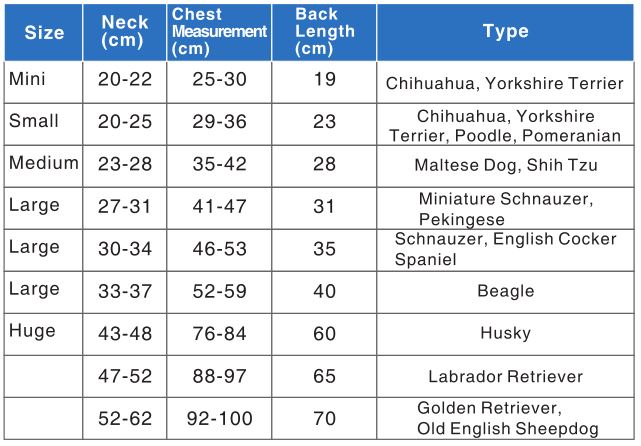

Dobe Dog Training and Anti-bark Warranty
1 Year Warranty! Our Dobe 1 year free for repair, If you ever have any issue with your collars for dogs, just contact us! Dobe US Based Customer Service 1511-881-5413 (Phone & Email) 6 Days a Week.
General Training Tips
Follow these tips on how to get the best out of your Dobe Dog Training System
- Make training sessions short and positive {between 10-15 minutes long for each session.) This will enable the dog to keep its attention focused on the trainer.
- Train one dog at a time.
- During the first initial training sessions, keep the dog in a familiar outdoor environment. Training in new locations may cause the dog to become distracted, causing you to reinforce commands with the Collar Receiver more than necessary.
- Use a long leash fastened to a non-metallic collar to help the dog’s learning. Ensure the additional collar and leash does not interfere
with the Contact Points on the Collar Receiver. Do not use the dog training system without a long leash until your dogs is fully trained. - More success will occur by teaching the dog a command first before trying to reinforce the command with Remote Transmitter.
- For basic obedience training, vibration is more useful.
- Issue one obedience command at a time, this will reduce confusion and allow the dog to remain focused. Do not use the training system for commands that the dog has not learned.
- During training, look for all the positive changes in the dog’s behavior and remember to reinforce them promptly with ample praise and reward.
- Avoid over-correcting your dog. Use as little remote correction as possible during the training process.
- When the dog has become apparently perplexed, shift the focus of the training by drawing the dog’s attention to a command they
have familiarity. Example: Tell the dog to sit and give abundant praise and encouragement on successful completion of the sit command. - Do not use the dog training system to correct or eliminate forms of aggression or biting behavior. When the dog is showing signs of aggressive behavior, immediately contact a professional dog trainer in your local area.
- Please keep in mind, that you should keep training sessions short and end every session on a high note. Stop training and play with the dog as soon the dog has accomplished a new level of proficiency.
Teaching Your Dog the Positive Tone
Before using the Trainer to correct your dog, spend 10 to 15 minutes per day for 2 or 3 days helping him create the association of the tone with reward and praise. To accomplish this:
- Push the Sound button for 2 consecutive seconds.
- Release the button and immediately reward your dog with verbal praise, petting, or a small food reward, Spend 3 to 5 seconds on your rewarding.
- Wait a few minutes and repeat holding the Sound button for 2 seconds following with praise.
Vary the reward to prevent your dog from anticipating a specific type. This stage of training is complete when your dog obviously anticipates a reward when he hears the positive tone.
Teaching Basic Obedience
The “Sit” Command
- Put a separate, non-metallic collar on your dog’s neck Above the Collar Receiver, and attach a 10-foot leash.
Note: be sure the extra collar does not put pressure on the contact points - Hold the leash and the Remote Transmitter in one hand. Keep your other hand free to guide your dog into a “Sit” position.
- Release the stimulation as soon as your dog sits and then give him praise.
- Release your dog from the “Sit” command and play.
- Repeat Step 2 through 4.

Note: If your dog breaks the “Sit” command, repeat steps 2 through 4, Keep you pet close to you while teaching the “Sit” command.
The “Come” Command
- Put a separate, non-metallic collar on your dog’s neck Above the Collar Receiver, and attach a 10-foot leash. Note: be sure the extra collar does not put pressure on the Contact Points.
- Hold the leash in one hand and the Remote Transmitter in the other.
- Wait for your dog to walk away from you. Once he’s far enough away, press and hold the stimulation button (electrostatic, vibration or beep) on your remote transmitter.
- Immediately give the “Come” command while holding down your desired stimulation button.
- Using the leash, gently guide your dog toward you until he begins to come in your direction.
- Immediately release the Stimulation Button as soon as your dog steps towards you, and praise him enthusiastically.
- Quickly move backwards as your dog begins to come back to you, praising him the entire time.
- Praise your dog when he returns to you.
- Repeat Steps 3 through 8.
- Once your dog responds readily to the Come command several times, back away from him without giving a command. When your dog turns towards you, give the command Come (without stimulation) and praise him while you continue to back up. Praise your dog when he returns to you.
- Use your leash to prevent your dog from running past you. If your dog manages to run past you, repeat Step 3 through 8.

The “Stay” Command
- Put a separate, non-metallic collar on your dog’s neck Above the collar Receiver, and attach a 10-foot leash.
Note: be sure the extra collar does not put pressure on the Contact Points. - Put your dog on his bed. Hold your leash in one hand and the Remote Transmitter in the other.
- Staying with 3 feet, walk the perimeter of the bed. Do not say anything to your dog.
- If your dog tries to leave the bed, press and hold the Stimulation Button and give the “Stay” command. Continue to hold the button until your dog is back on his bed. If necessary use the leash to guide your dog onto his place.
- Once your dog has settled for a few seconds, release him and play calmly.
- Repeat steps 3 through 5.
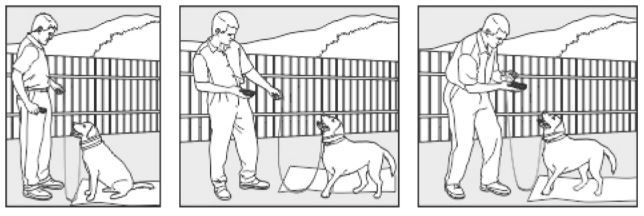
Eliminating Unwanted Behaviour
Jumping UP
Pets typically jump up to get attention. If you do not want your dog to jump on you, then friends or members of the family should not encourage this behavior. That means every lime your dog jumps on someone, he should be reprimanded or redirected to an alternate and acceptable behavior, for which he can receive praise.
Note: It is best if your dog first understand the Sit command.
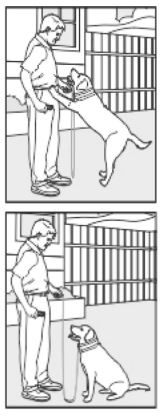
- As soon as your dog lifts his paws off the ground to jump on you, press the Stimulation Button and give the “Sit” command.
- Release the Stimulation Button immediately once your dog is sitting, and verbally praise him.
- If your dog ignores this stimulation, increase the intensity Level until he/she responds.
- Practice this exercise in several different areas and use different people for distractions.
Digging
It is important to first understand why your dog is digging. Many dogs, such as terriers, were bred to flush out prey, and digging is very innate to them. Other dogs may be digging to find a cool spot to lie down, or simply out of boredom. Your dog may no longer have the desire to dig if he is provided with the following:
A cool, shaded area in which to lie down, and plenty of water.
An alternate activity, such as a favourite toy.
Plenty of play, exercise, and attention.
A yard free from rodents or prey that he may be trying to flush out.
- Place the Receiver on your dog and wait at least 10 minutes before placing him in the yard. No other people or pets should in the yard, as you do not want your dog to associate the stimulation with anything other than his digging. Your dog must be securely fenced in or contained during training.
- From a window or area where your dog can not see you. Wait until your dog begins to dig.
- While your dog digs, press the Stimulation Button and release it when he stops digging. Only press the button while your dog is in the act of digging, and do not say anything to him.
- If your dog ignores this stimulation, increase the Intensity Level.
- Continue to watch your dog, as he may choose another area to dig.
- Do not allow your dog in the yard unsupervised until he has completely stopped digging.

Cashing
Chasing is an instinctive behavior stimulated by moving objects. Some dogs have particularly strong desire to chase that can put them in harm’s way and leave you helpless. Never allow your dog off the leash or out of a contained area until he has learned the “Come” command, regardless of distraction Be consistent and correct your dog every time he chases something.
CAUSION
It is vitally important that you and your dog remain safe while carrying out this training. Your dog Should be on a strong leash, long enough for him to attempt to chase an object, but short enough for him not to reach a road or other unsafe area. You must also be physically strong enough or restrain your dog when he tries to chase.
- If your dog has not learned the “Come” command, keep a leash on him so you can physically stop him before he reaches the object he is chasing.
- Set up a scenario where your dog is enticed to chase an object. Common items could be cars, motorcycles, bicycles, etc. (Do not use toys.)
- When the object passes in front of your dog, make sure to hold the leash with a firm grip. As soon as your dog begins to chase the object, press and hold the Stimulation button until he stops.
- When your dog stops chasing the object, immediately release the button, walk backwards and give the Command “Come”. Praise your dog as he comes to you.
- Repeat the process until your dog stops chasing the object.

Trash Raiding
The easiest way prevent trash raiding is to remove garbage and tempting food from your dog’s environment. You can use the Dog Training System to teach your dog to stay away from these items; however, you must be prepared to correct your pet every time he approaches them.
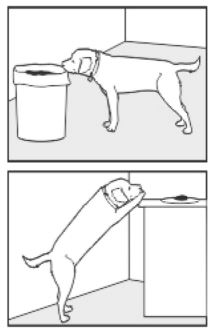
- Pick a temptation for your dog and position yourself where he can not see you.
- While your dog’s mouth is touching the temptation, press and hold the Stimulation button. Immediately release the button when your dog leaves the temptation.
- Do not say anything, as you want your dog to associate the Stimulation with his behavior, not you.
- If your dog does not respond to the Stimulation, increase the Intensity Level and repeat the process.
- Repeat this process in several different locations with different temptations.
Excessive Barking
Barking is an instinctive behavior for dogs. It is impossible to keep your dog from barking entirely, but you can teach him be quiet when you give him a command.
Note: this will only be effective when you are at home with your dog.
Choose your pet’s Recognition Level. Put your dog in a situation that will tempt him to bark.
When your dog begins to bark, press the Electrostatic Pulse button and give him the command “Quiet” . Immediately release the button once your dog stops barking and praise him.
If your dog ignores the Stimulation and continues to bark, increase the Intensity Level by I and repeat the process.